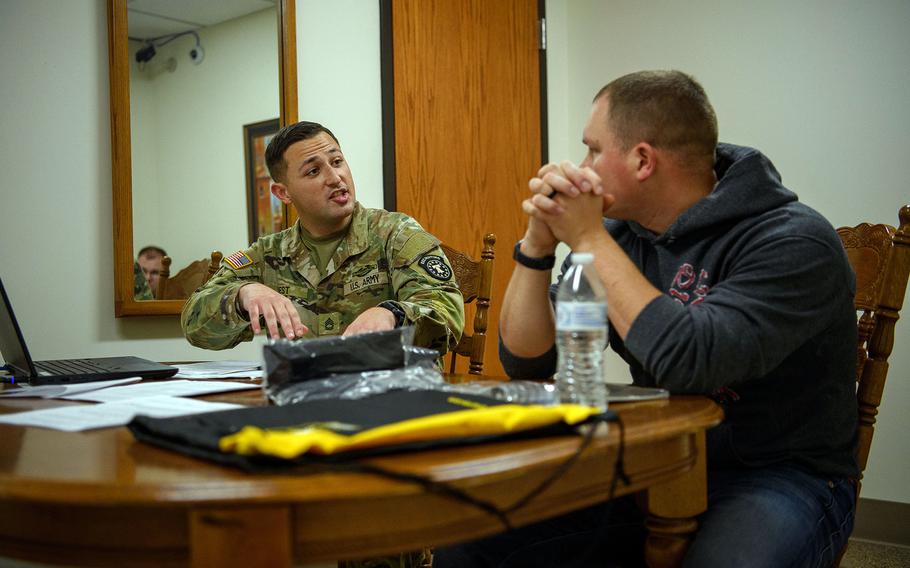
The Army was 15,000 soldiers short of its 60,000 recruitment goal in 2022, a number the service raised to 65,000 this year. (Lara Poirrier/U.S. Army)
The U.S. Army has a recruiting problem. The Army only added 40% of the soldiers it needed in 2022 and the secretary of the Army made new enlistments her number one priority for 2023. Her sense of urgency is embodied in the resurrection of the “Be All You Can Be” campaign, which feels like a Hail Mary after years of lucrative marketing contracts.
The brand simply does not appeal to young Americans. Army leaders attribute their shortfalls to American obesity and declining aptitude and to the most challenging labor market since the Army became all-volunteer in 1973. This personnel crisis is poorly timed as expected troop cuts in Europe were reversed and the U.S. attempts to deter a Chinese invasion of Taiwan.
If the recruiting shortfall continues, the Army will eventually do what it has always done to fill its ranks. It will rely on immigrants.
In the buildup to World War II, for instance, Congress exempted non-citizen soldiers from most naturalization requirements, to include proof of lawful entry. And both Congress and the executive branch have a more recent record of naturalizing immigrants in return for military service. Over 150,000 non-citizens were naturalized after they volunteered to fight in the post-9/11 wars.
During these recent wars, the Army embraced an innovative program that recruited foreign doctors and those with critical language skills, as the Army had an unmet demand for these skill sets. The Military Accessions Vital to the National Interest program, known as MAVNI, selected skilled non-citizen soldiers eager to fight for the American dream, including those without legal permanent residence.
In addition to filling critical jobs like a rifleman or driver, the cultural competencies of immigrants enhance the tactical Army and save American lives. I saw this firsthand while deployed on a counterterrorism mission in Africa.
A Nigerian-born American soldier opened doors for my Special Forces detachment in the Nigerian military’s hierarchy. Those doors were otherwise closed to me or any other white American officer. Our success was a result of having that soldier on our team. The Army can have that type of instant rapport anywhere in the world by enlisting non-citizen soldiers.
The Army has always been strengthened by immigrants. Immigrant volunteers are smart, fit and eager to fight, unlike so many of their contemporary American counterparts.
Despite all of this, divisive immigration politics have led the Pentagon to shoot itself in the foot by making the military unwelcoming to the immigrants it has long relied on, and now needs.
Previously, Pentagon polices were in place to protect its volunteers from draconian immigration laws with the shield of citizenship. For instance, prior to 2017 non-citizens who enlisted in the Army were greeted by a U.S. Citizenship and Immigration Services field office at Basic Training to process naturalization applications. But USCIS was abruptly removed from Basic Training in 2017 when the Pentagon caved to the Trump administration’s hard line on immigration. As a result, non-citizen soldiers often leave Basic Training without the citizenship their recruiters likely promised.
Moreover, the Department of Defense rescinded the MAVNI program, added a 180-day requirement before a soldier could apply for naturalization, and screened out soldiers with arbitrary justifications.
Even getting the simple certification of service required for expedited military naturalization has been deliberately obstructed. Now, a colonel’s signature is required. This is a needless rule. Certifying service is a straightforward matter that any unit administrative clerk can accomplish. Such seemingly innocuous clerical requirements have real consequences — in the wake of this policy, there was a whopping 78% drop in military naturalizations from 2017 to 2018.
To add insult to injury, soldiers who miss out on citizenship during their service, including those who served in combat, are too often deported. If there’s a greater disincentive to enlisting than the risk of being deported from the country you’ve risked your life for, I can’t think of one.
Instead of these bureaucratic barriers, the Army needs to support its immigrant soldiers in obtaining citizenship every step of the way.
And there are simple steps the Army can take now. It should start by bringing Basic Training naturalizations back, as the Navy has recently done. The Army should also request that USCIS accept an administrative certification of military service in lieu of the often unattainable brigade commander’s signature. Critically, the Army should advocate for the reinstitution of the MAVNI program, so that it can welcome all the qualified people it needs. Finally, the Army should protect its veterans from the tragic irony of deportation.
To be all it can be, the Army needs to fully open its doors to the immigrants eager to serve and deliver on its promise of citizenship. It’s not only the right thing to do — for the Army, it’s a matter of self-preservation.
Matt Sardo is a student in Berkeley Law’s Veterans Law Practicum at the University of California, Berkeley. He is also an Army ROTC instructor at the university and a board director for the Irregular Warfare Initiative. He served as an infantryman and a Green Beret before law school. He deployed to Afghanistan with the 10th Mountain Division and Northwest Africa with 3rd Special Forces Group. The views expressed here are those of the author and do not reflect the official position of the U.S. Army Reserve, the Department of the Army, or the Department of Defense.